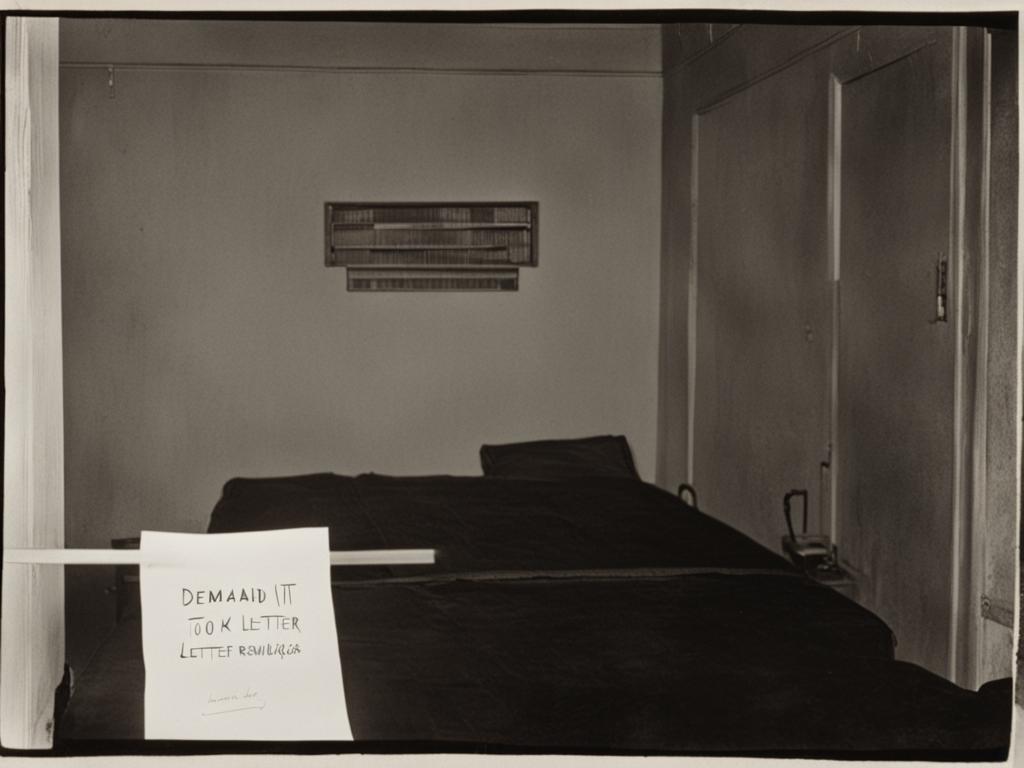Effective Demand Letter to Landlord Tips: Assert Your Rights with Strategic Tips for Drafting a Demand Letter to Landlord
If you’re facing a dispute or issue with your landlord, drafting a demand letter can be an effective way to address the problem and assert your rights before considering legal action. By clearly communicating your concerns and demands, you can potentially resolve the issue without the need for a costly and time-consuming lawsuit.
In this section, we will provide you with valuable tips on how to craft a persuasive demand letter to your landlord. We’ll cover what essential information to include, how to present your case, and the importance of properly sending the letter for maximum impact.
By mastering the art of writing an impactful demand letter, you can assert your tenant rights, compel your landlord’s attention, and seek a fair resolution to your dispute. Let’s dive in and discover how to draft a demand letter that gets results.
Key Takeaways
- Writing a demand letter to your landlord can help address disputes and claims before resorting to legal action.
- A demand letter serves as a formal notice of your intent to take legal action and can encourage a settlement without court involvement.
- Include specific details and evidence in your demand letter, such as quoting lease agreements or citing violations of housing codes.
- You may consider hiring an attorney to assist with complex cases or when navigating legal language.
- Once you have drafted your demand letter, choose a suitable method to send it, such as certified mail or email with a read receipt.
Reasons to Send a Demand Letter to a Landlord
When faced with disputes over rent increases, lease terminations, or security deposit refunds, sending a demand letter to your landlord can be a proactive and effective approach. A demand letter is a formal written communication that outlines your grievances, demands, and desired resolution. Here are the key reasons why you should consider sending a demand letter:
- Rent Increase Dispute: If you believe that your landlord has increased your rent unfairly or without proper notification, a demand letter can outline your concerns and seek clarification on the matter.
- Lease Termination: In the event of an illegal lease termination or non-compliance with the terms of your lease agreement, a demand letter can assert your rights as a tenant and request a cancellation of the termination.
- Security Deposit Refund: When your tenancy comes to an end, disputes may arise regarding the return of your security deposit. A demand letter can request a full refund of the deposit, providing evidence of your entitlement to it.
By sending a demand letter, you demonstrate your willingness to resolve the issue amicably while asserting your legal rights as a tenant. It can be a crucial first step towards finding a satisfactory resolution without the need for costly legal proceedings.
Importance of a Demand Letter to a Landlord
A demand letter to a landlord serves as a formal notice of your intent to take legal action if a dispute cannot be resolved. It can also help you gather and organize evidence for your case. Additionally, a demand letter shows that you are serious about resolving the dispute and may encourage a settlement without incurring court costs.
If you have been experiencing issues with your landlord, such as unaddressed maintenance problems or violations of your rights as a tenant, it is crucial to assert your rights and hold your landlord accountable. By sending a demand letter, you are taking a proactive approach to address your concerns and seek a resolution.
One of the primary benefits of a demand letter is that it clearly outlines your grievances and the actions you expect your landlord to take. This formal document should detail the specific responsibilities that a landlord has failed to fulfill, such as maintaining the property in a safe and habitable condition, addressing repairs in a timely manner, or adhering to state or local housing regulations.
The demand letter should also include any evidence or documentation you have gathered to support your claims. This may include photographs of the property’s condition, copies of relevant lease agreements or communication with the landlord, or any records of complaints you have made in the past.
By sending a demand letter, you are putting your landlord on notice that you are prepared to escalate the matter if necessary. This can help motivate them to take your concerns seriously and seek a resolution to avoid the time and expense of going to court.
Remember, a demand letter is not only about asserting your rights; it is also an opportunity for negotiation and resolution. It shows that you are willing to engage in a constructive dialogue to resolve the dispute.
In some cases, the mere act of sending a demand letter may prompt your landlord to address the issue promptly, as they may wish to avoid the potential negative consequences of legal action. By clearly articulating your complaints and expectations, you increase the likelihood of a favorable outcome without having to involve the courts.
Ultimately, a demand letter can be a crucial first step in resolving disputes with your landlord. It helps establish a clear record of your grievances and can serve as evidence if legal action becomes necessary. By taking a proactive approach and asserting your rights, you demonstrate that you are a knowledgeable tenant who expects their landlord to fulfill their responsibilities.

Writing a Demand Letter to a Landlord
When facing issues with your landlord that require resolution, writing a demand letter can be an effective step before considering legal action. A demand letter serves as a formal notice, clearly outlining your concerns and expectations. To ensure the letter’s effectiveness, it is crucial to include specific details and be clear about the issues you are addressing.
Here are some important elements to consider when writing a demand letter:
- Be concise and specific: Clearly state your grievances and the desired outcome. Provide a brief but thorough description of the issues you are facing, such as rent increases, lease violations, or unsafe living conditions.
- Reference your lease agreement: Quote relevant sections of your lease agreement that support your claims. This helps establish the contractual obligations your landlord has failed to meet.
- Present evidence: Include any evidence you have to substantiate your claims. This may include photographs of damages, documentation of repairs requested but not addressed, or records of communications with your landlord.
- Highlight violations of housing codes: If applicable, identify any violations of housing codes or local ordinances. These violations can further strengthen your case and put pressure on your landlord to rectify the situation.
- Convey your intentions: Clearly express your intent to pursue legal action if the issues are not resolved satisfactorily. However, maintain a professional and respectful tone throughout the letter.
Keep in mind that the goal of a demand letter is to encourage your landlord to address the issues and avoid further legal escalation. Therefore, it is essential to remain level-headed and avoid confrontational language. While legal action may be an option, attempting to resolve the matter amicably should be your initial approach.
Sample Demand Letter to a Landlord
Dear [Landlord’s Name],
I am writing to bring to your attention several ongoing issues that require immediate resolution within the next 14 days. These issues include:
- Failure to address multiple repair requests, including a leaking roof, faulty electrical wiring, and mold growth in the bathroom.
- Violation of housing codes, as outlined in Section X of our lease agreement. Specifically, the property lacks adequate heating during the winter months.
- Repeated unauthorized entry into the rental unit without proper notice or legal justification.
Please be advised that if these issues are not promptly resolved, I will be left with no choice but to pursue legal action to protect my rights as a tenant. I would prefer to resolve these matters amicably and avoid the associated costs and time-consuming legal proceedings.
I have enclosed photographs and copies of the repair requests I have submitted over the past six months, which have been met with no action from your side. These documents clearly demonstrate the ongoing and serious nature of the issues.
I trust that you will take immediate action to address these concerns and ensure the habitability and compliance of the property. I look forward to receiving a comprehensive response within the next 14 days.
Thank you for your prompt attention to this matter.
Sincerely,
[Your Name]
Hiring an Attorney for a Demand Letter to a Landlord
While writing a demand letter to your landlord doesn’t necessarily require hiring an attorney, there are important considerations to keep in mind. Depending on the complexity of your case and the potential legal implications, consulting with an attorney may be advisable. Let’s explore the pros and cons of hiring an attorney for your demand letter.
Pros of Hiring an Attorney
Hiring an attorney brings several advantages to the table:
- Legal Expertise: Attorneys specialize in understanding the intricacies of landlord-tenant law. They can provide accurate legal advice and ensure your demand letter adheres to all relevant statutes and regulations.
- Experience in Dispute Resolution: Attorneys have experience in negotiating and resolving complex legal disputes. They can help you strategize your case, increasing the chances of a successful outcome.
- Professional Representation: Having a lawyer representing you often adds weight to your demands. Landlords may take your concerns more seriously when they see that you have legal representation.
Cons of Hiring an Attorney
Before deciding to hire an attorney for your demand letter, it’s important to consider the potential drawbacks:
- Cost: Hiring an attorney can be expensive, depending on their hourly rate and the complexity of your case. Legal fees can quickly add up, especially if your dispute escalates to litigation.
- Time: Engaging an attorney can extend the timeline of resolving your issue. Lawyers may require additional time to review your case, draft the demand letter, and communicate with the landlord or their legal counsel.
It’s essential to assess your specific situation and the gravity of your legal dispute before deciding whether to engage an attorney. If the legal fees incurred outweigh the potential benefits or if your case is relatively straightforward, you may choose to proceed without legal representation.
However, if your case involves complicated legal aspects, significant financial stakes, or the potential for a prolonged legal battle, it’s highly recommended to consult with an attorney.

Choosing the Right Attorney
If you decide to hire an attorney, it’s crucial to find the right one who specializes in landlord-tenant law. Look for attorneys with experience in handling similar cases and a track record of successful outcomes for their clients. Take advantage of initial consultations to discuss your case and evaluate whether you feel comfortable working with them. Remember to inquire about their fee structure to ensure it aligns with your budget and expectations.
| Considerations when Hiring an Attorney | Questions to Ask |
|---|---|
| Specialization in landlord-tenant law | Do you have experience with cases similar to mine? |
| Track record and success rate | What outcomes have you achieved for clients facing similar issues? |
| Fee structure | How do you charge for your services, and what are the expected costs? |
| Availability and communication | What is your preferred method and frequency of communication? |
Remember, hiring an attorney can significantly impact the outcome of your case. Take the time to research and select an attorney who best meets your needs and provides the expertise necessary to effectively address your concerns with your landlord.
Sample Demand Letter to a Landlord
Writing a demand letter to your landlord is an effective way to communicate your concerns and seek resolution for issues related to your tenancy. To help you understand how to structure and personalize your own demand letter, here is a sample letter involving a tenant seeking reimbursement for out-of-pocket expenses that the landlord should have covered.
Date: [Insert Date]
[Your Name]
[Your Address]
[City, State, Zip Code]
[Landlord’s Name]
[Landlord’s Address]
[City, State, Zip Code]
Subject: Demand for Reimbursement of Out-of-Pocket Expenses
Dear [Landlord’s Name],
I hope this letter finds you well. I am writing to formally request reimbursement for out-of-pocket expenses that I have incurred due to maintenance issues in my rented property located at [Property Address]. As per our lease agreement, it is the landlord’s responsibility to maintain the premises in good condition and promptly address any necessary repairs.
On [Date], I reported to you the following issues that require immediate attention:
- Leaking roof in the master bedroom causing water damage to the ceiling
- Non-functioning air conditioning unit in the living room
Despite my written notice and multiple verbal reminders, these issues remain unresolved, significantly affecting my quality of life and causing financial burden. As a result, I have had to hire professionals to address the problems and cover the associated expenses out of my own pocket, as detailed below:
Expense Date Amount Roof repair and restoration [Date] $[Amount] Air conditioning repair and servicing [Date] $[Amount] I kindly request reimbursement for the total amount of $[Total Amount] within [Specify Timeframe, e.g., 14 days] from the receipt of this letter. Failure to compensate me for these expenses will leave me with no choice but to take further legal action to protect my rights as a tenant.
Please be aware that I have kept detailed records of all correspondence, including copies of my maintenance requests, quotes, invoices, and receipts. I remain committed to resolving this matter amicably, but I trust you will understand the importance of addressing the issue promptly and fairly.
I trust that you will give this matter the attention it deserves and promptly respond in writing to confirm your receipt of this demand letter and your course of action to resolve the issue. Should I not receive a satisfactory response within the specified timeframe, I will have no other option but to seek legal remedies to protect my rights.
Thank you for your immediate attention to this matter.
Sincerely,
[Your Name]
Remember, this sample demand letter is provided as a guide to help you structure your own letter. Make sure to personalize it to address the specific circumstances of your situation before sending it to your landlord.
Important Note:
Before sending your demand letter, consult with a legal professional to ensure that you understand your rights and obligations as a tenant. This will help you navigate the legal processes effectively and determine the best course of action to address your particular situation.

Sending a Demand Letter to a Landlord
Once you have drafted your demand letter, the next step is to send it to your landlord. The method you choose for sending the letter can have an impact on its effectiveness and the ability to track its delivery. Here are some tips to consider when sending a demand letter:
- Method of Delivery: Decide whether you will send the demand letter via email or mail. Email can be a convenient and quick method, but make sure to follow up with a hard copy letter sent via certified mail to ensure a paper trail. This provides a more official and legally recognized form of communication.
- Tracking: Regardless of the chosen delivery method, it is crucial to track the letter to ensure it reaches the intended recipient. In the case of an email, request a read receipt or delivery confirmation. If you opt for certified mail, use the tracking service provided by the postal service to monitor its journey.
- Signature Required: Consider requesting a signature upon receipt of the demand letter. This ensures that the landlord cannot claim they did not receive it, and provides proof of delivery in case of future legal proceedings. A signature requirement adds an extra layer of security and validation to your communication.
By using these tips, you can enhance the effectiveness and credibility of your demand letter. Tracking the letter and requesting a signature also give you peace of mind, knowing that your landlord has received the letter and is aware of the issues at hand.

| Delivery Method | Advantages | Disadvantages |
|---|---|---|
| Quick and convenient Can save costs on postage Ability to attach supporting documents |
No physical proof of delivery Emails can be ignored or overlooked May not be legally recognized as formal communication without a hard copy follow-up |
|
| Certified Mail | Provides paper trail and proof of delivery Legally recognized form of communication Signature requirement ensures acknowledgment |
Requires postage fees Takes longer for delivery May not be convenient if landlord is difficult to reach |
Conclusion
A demand letter can be a highly effective tool for tenants in resolving disputes and upholding their rights when dealing with their landlords. By following the tips and guidelines outlined in this article, you can confidently draft a well-structured demand letter that clearly communicates your concerns and desired resolution.
Remember, the purpose of a demand letter is to open up a dialogue and encourage a resolution without the need for legal action. By asserting your rights and presenting a strong case in your letter, you increase the chances of reaching a satisfactory outcome.
It is important to keep a record of your demand letter and any subsequent communication with your landlord. This documentation can serve as evidence if legal action becomes necessary in the future. By maintaining thorough records, you can effectively protect your interests and ensure that you are on solid footing should the need arise.
In conclusion, a demand letter is a proactive step towards resolution, allowing you to assert your rights and address conflicts in a professional manner. With careful preparation and adherence to the tips provided, you can handle disputes with your landlord confidently and successfully.
FAQ
What is a demand letter to a landlord?
A demand letter to a landlord is a formal notice of your intent to take legal action if a dispute cannot be resolved. It serves as a way to address disputes and claims before resorting to legal action.
What are common reasons to send a demand letter to a landlord?
Common reasons to send a demand letter to a landlord include disputes over rent increases, lease terminations, and security deposit refunds.
Why is a demand letter to a landlord important?
A demand letter to a landlord is important as it helps gather and organize evidence for your case, shows your seriousness in resolving the dispute, and may encourage a settlement without incurring court costs.
What should I include in my demand letter to a landlord?
When writing a demand letter to your landlord, it is important to include specific details and be clear about the issues you are addressing. This includes quoting sections of your lease agreement and providing evidence of damages or violations of housing codes.
Do I need to hire an attorney to write a demand letter?
While hiring an attorney is not a formal requirement, there are considerations to keep in mind such as legal fees and the complexity of your case.
Can you provide a sample demand letter to a landlord?
Yes, we have a sample demand letter available which can serve as a guide for creating your own demand letter. It involves a tenant seeking reimbursement for out-of-pocket expenses that the landlord should have covered.
How should I send my demand letter to a landlord?
There are different methods of sending a demand letter, such as via email or mail. It is recommended to track the letter and request a signature for confirmation of receipt.
What can a demand letter to a landlord help me achieve?
A demand letter to a landlord can help address disputes and assert your rights as a tenant. By effectively communicating your concerns, you may potentially reach a resolution without resorting to legal action.

